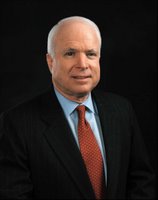 John McCain is guilty of a crime that bothers me to no end. He uses political buzzwords that are actually the opposite of what he means to say. I believe George Orwell called this phenomenon “doublespeak” if I remember my literature correctly. It is a cleaver and devious political ploy used by those in need of power and support.
John McCain is guilty of a crime that bothers me to no end. He uses political buzzwords that are actually the opposite of what he means to say. I believe George Orwell called this phenomenon “doublespeak” if I remember my literature correctly. It is a cleaver and devious political ploy used by those in need of power and support.McCain appeared on George Stephanopoulos’s show on Sunday and was asked how he felt about Roe V Wade. He said he would support the decision being returned to the states instead of the Federal government deciding because “I’m a federalist." Only supporting state’s rights is not Federalism, it is the exact opposite of it. A Federalist is one who supports a strong central government by definition. McCain wanting the states to decide on their own is a very strong anti-Federalist position, not a Federalist one.
To understand the difference between a Federalist and an anti-Federalist one must go back to the founding of our constitution. There were those who wanted a strong central government to rule over all the states. These were the Federalists. They felt is was the best way to ensure all states followed the same rules and gave equally to the growing country. They felt the Articles of the Confederation left the United States weak and unprotected.
The Federalists were right in some regards, but they were countered by the anti-Federalists who feared the tyranny of the majority. They believed that the states were in the best position to decide what is best for them and there should be as little federal interference as possible in the day-to-day running of the state. They remembered that America was founded partially out of the fear of a strong central government.
I am not going to get into which side is right because there is no right answer. There are valid arguments for and against both these points of view, but McCain managed to use these terms in just the wrong way to come across as a “talking point spouting” fool. He cannot support state’s rights as a Federalist. It is that simple.
I know he is referring to the Nixon New Federalist movement when he calls himself a Federalist and not a supporter of Madison. Nixon stated that the new Federalists believed major issues such as abortion and gay rights should be decided by the states, but Nixon was wrong in his use of the word plain and simple and so is McCain. Supporting the states deciding on their own is being an anti-Federalist.
The entire reason for the change is that McCain does not want to refer to himself as an anti-Federalist. The average person hears “anti” placed with “federal”-anything and they get jumpy. McCain should not alter historical terms for his own convince though. Either say you are an Anti-Federalist or say nothing. The doublespeak must end already and I expected more from the “maverick Republican” moderate.
So ends his 2008 Presidential bid I hope. The man either does not understand or is purposely talking out of both sides of his mouth. Either way he is no longer qualified to be President.
3 comments:
I used to like McCain. These days, he reminds me of nothing so much as an oversized, warm-blooded Howdy Doody.
The anti-federalists are incorrectly labeled as "anti." This historical inaccuracy is repeatedly the subject of journal articles and books. Although I am not a huge supporter of McCain either, I suggest that before spouting off about the incorrect use of the term "federalist," I suggest you research the true definition of federalism. It gives your argument greater legitimacy. Federalism: A system of government in which power is divided between a national (federal) government and various regional governments. As defined by the United States Constitution, federalism is a fundamental aspect of American government, whereby the states are not merely regional representatives of the federal government, but are granted independent powers and responsibilities. With their own legislative branch, executive branch, and judicial branch, states are empowered to pass, enforce, and interpret laws, provided they do not violate the Constitution. This arrangement not only allows state governments to respond directly to the interests of their local populations, but also serves to check the power of the federal government. Whereas the federal government determines foreign policy, with exclusive power to make treaties, declare war, and control imports and exports, the states have exclusive power to ratify the Constitution. Most governmental responsibilities, however, are shared by state and federal governments: both levels are involved in such public policy issues as taxation, business regulation, environmental protection, and civil rights.
Anon,
I did do my research on the Federalists. McCain said he was a Federalist. They supported a central government.
Under Nixon Federalism changed to include state's rights. The definition you are using is a modern one that I was unaware of when I wrote this piece. I am assuming you read this at blogcritcs so I would recommend reading the discussion there. It really adds to this piece. I should link to it actually.
Post a Comment